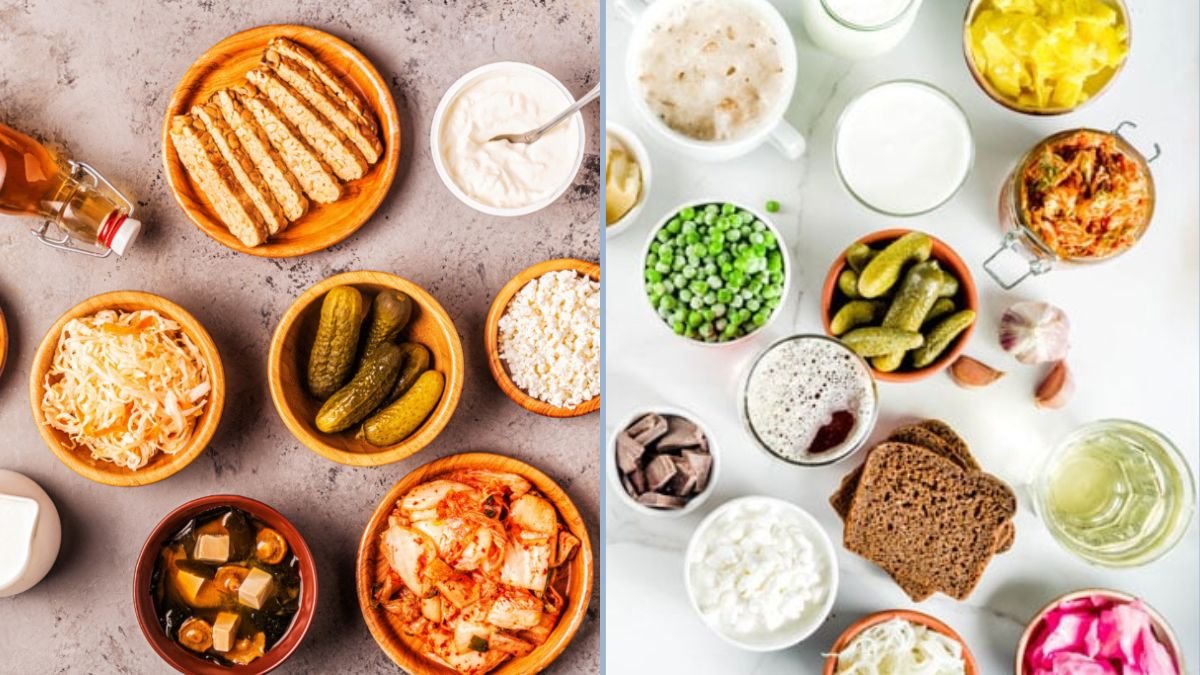The human gut is home to trillions of microorganisms, collectively known as the gut microbiota, which play a crucial role in digestion, immunity, and overall health. Maintaining a healthy balance of these microorganisms is essential, and probiotics—live beneficial bacteria—can support gut health and provide a range of physiological benefits. While probiotics are often associated with dairy products, many plant-based foods offer effective probiotic support. This article explores the benefits of probiotics, the types of foods that provide them, and practical strategies to incorporate them into a vegetarian diet.
Understanding Probiotics
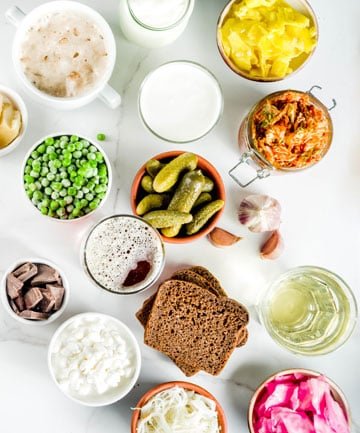
Probiotics are live microorganisms that, when consumed in adequate amounts, confer health benefits to the host. They primarily colonize the gut, promoting a balanced microbiota and supporting digestion, immunity, and metabolic processes.
Key types of probiotic bacteria include:
- Lactobacillus species: Common in fermented vegetables and plant-based yogurts
- Bifidobacterium species: Found in fermented soy products and some fiber-rich foods
- Saccharomyces boulardii: A beneficial yeast often used in fermented beverages
Health Benefits of Probiotics
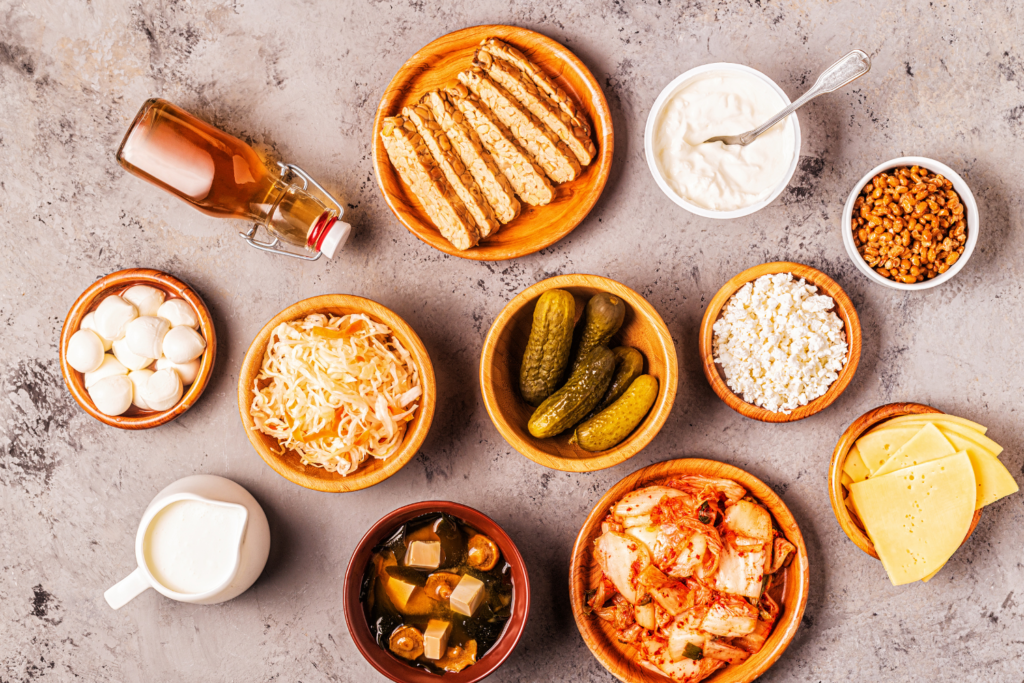
Probiotics contribute to multiple aspects of health, making them a valuable component of a vegetarian diet:
1. Supports Digestive Health
Probiotics help maintain a healthy balance of gut bacteria, reducing symptoms of bloating, constipation, diarrhea, and irritable bowel syndrome (IBS). They assist in breaking down complex carbohydrates and fiber, improving nutrient absorption and digestive efficiency.
2. Strengthens the Immune System
Approximately 70% of the immune system resides in the gut, where probiotics play a critical role in defending against pathogens. They stimulate immune cells, support antibody production, and reduce inflammation, enhancing overall immune function.
3. Reduces Risk of Gastrointestinal Infections
Certain probiotics produce antimicrobial substances that inhibit harmful bacteria, helping prevent gastrointestinal infections and promoting gut homeostasis.
4. Enhances Nutrient Absorption
Probiotics aid in the absorption of vitamins and minerals, particularly B vitamins, vitamin K, calcium, and magnesium, ensuring optimal nutritional status from a vegetarian diet.
5. Supports Mental Health
The gut-brain axis links the digestive system with mental and emotional health. Probiotics can influence neurotransmitter production, reduce stress, and improve mood, offering potential benefits for mental well-being.
6. Helps Maintain Healthy Weight and Metabolism
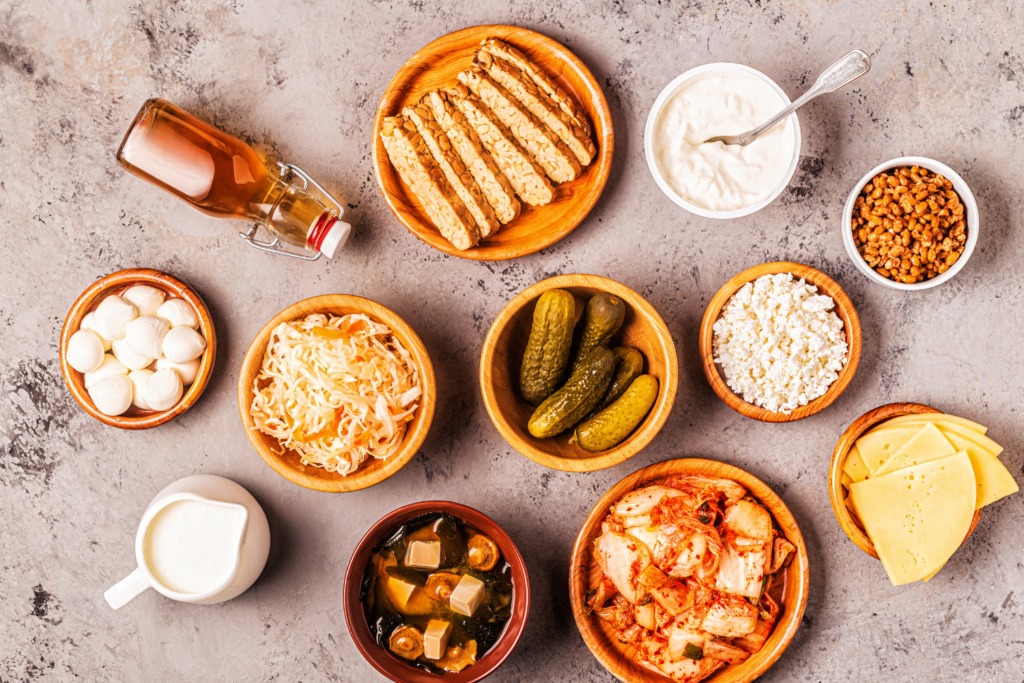
Probiotics can influence metabolism, fat storage, and appetite regulation. Certain strains support healthy weight management and glucose metabolism, complementing a balanced vegetarian diet.
Probiotic-Rich Vegetarian Foods
Vegetarians have access to a wide variety of foods naturally rich in probiotics. Fermentation is the primary method by which these foods gain live beneficial bacteria.
1. Fermented Vegetables
- Sauerkraut: Fermented cabbage rich in Lactobacillus species
- Kimchi: A Korean dish made from fermented cabbage, radish, and spices
- Pickles: Naturally fermented pickles (avoid those made with vinegar, which do not contain live probiotics)
- Carrot and beet kvass: Fermented root vegetable beverages
2. Fermented Soy Products
- Tempeh: Fermented soybean cake that contains probiotics and is rich in protein
- Miso: A fermented soybean paste used in soups and dressings
- Natto: Fermented soybeans with high probiotic content (particularly beneficial for gut health)
- Plant-based yogurts: Made from soy, coconut, or almond milk, often fortified with probiotics
3. Fermented Grains and Beverages
- Sourdough bread: Traditional sourdough uses wild fermentation to develop beneficial bacteria
- Kefir: Plant-based kefir (made from coconut, soy, or rice milk) contains Lactobacillus species and yeast
- Kvass and fermented teas: Drinks like kombucha provide probiotics and antioxidants
4. Other Probiotic Sources
- Fermented nut and seed cheeses: Made from cashews, almonds, or sunflower seeds
- Fermented vegetable spreads: Such as beet or carrot spreads with live cultures
Tips for Incorporating Probiotics into Your Diet
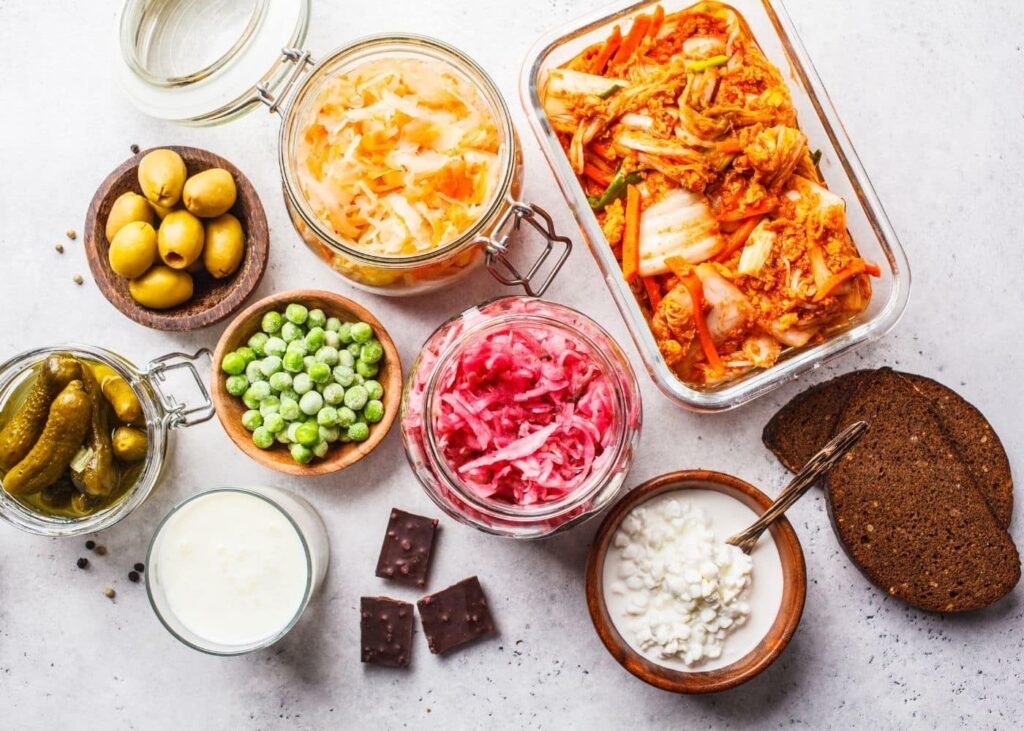
1. Include Fermented Foods Daily
Aim to consume a variety of fermented foods to ensure different strains of beneficial bacteria. For example:
- Breakfast: Plant-based yogurt with fruit
- Lunch: Sourdough sandwich with fermented vegetable toppings
- Snack: Kombucha or fermented vegetable salad
2. Combine with Prebiotics
Prebiotics are non-digestible fibers that feed probiotics, enhancing their growth and effectiveness. Foods rich in prebiotics include:
- Garlic, onions, and leeks
- Asparagus and artichokes
- Bananas, apples, and berries
- Whole grains like oats and barley
Combining probiotics and prebiotics creates a synbiotic effect, promoting gut health and improving overall digestion.
3. Preserve Live Cultures
Probiotics are sensitive to heat and processing. To maintain their benefits:
- Choose unpasteurized or raw fermented foods
- Avoid overheating fermented foods during cooking
- Store fermented foods in the refrigerator to preserve live bacteria
4. Start Slowly
Introducing probiotics gradually allows the gut to adapt, reducing the risk of bloating or mild digestive discomfort. Begin with small portions and increase gradually.
5. Opt for Variety
Different probiotic strains provide distinct benefits. Incorporate a range of fermented foods to support digestive, immune, and metabolic health comprehensively.
6. Pair with Fiber-Rich Foods
Fiber supports probiotic survival and gut colonization. Include vegetables, fruits, legumes, and whole grains alongside fermented foods to maximize benefits.
Sample Probiotic-Rich Vegetarian Day
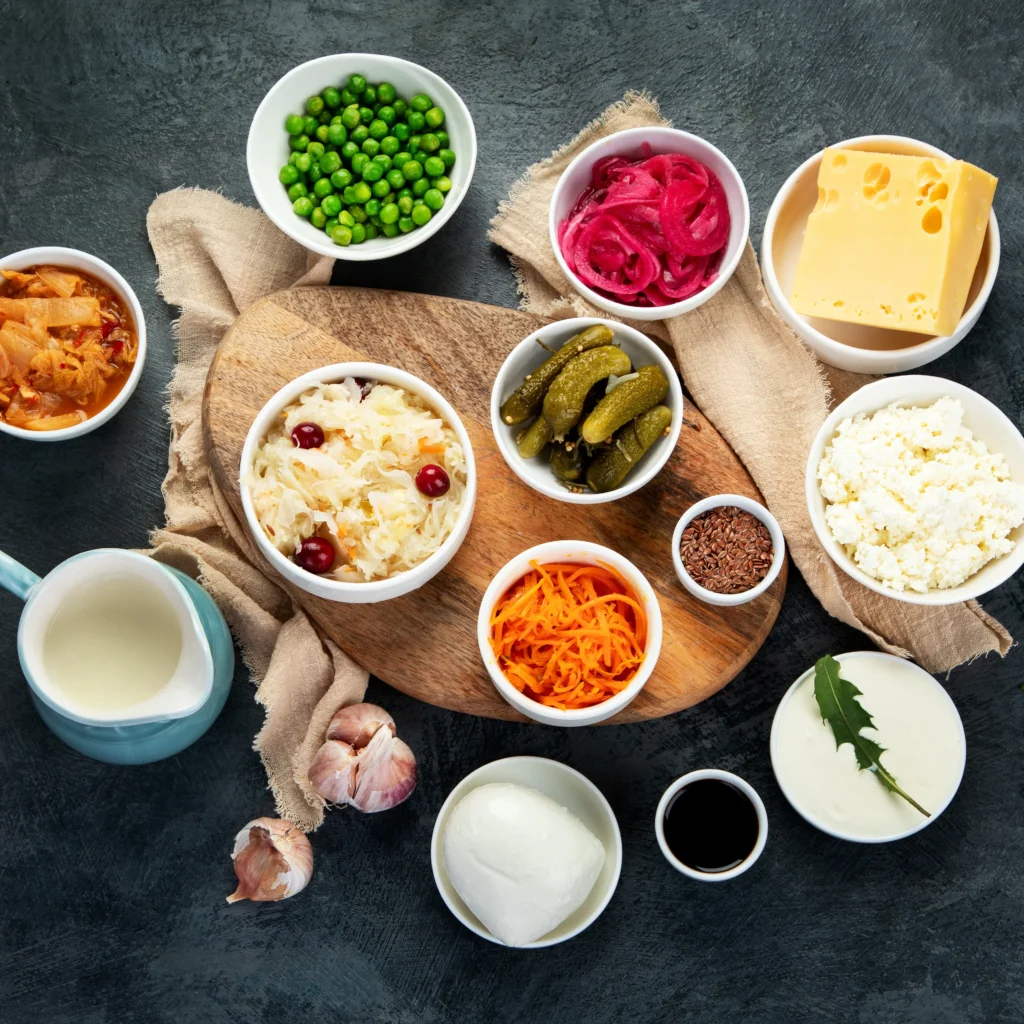
Breakfast
- Soy yogurt with berries, chia seeds, and a sprinkle of flaxseeds
- Optional: Add a spoonful of plant-based granola
Lunch
- Tempeh and vegetable stir-fry over brown rice
- Side of kimchi or fermented carrot salad
Snack
- Kombucha or coconut kefir
- Handful of almonds or walnuts
Dinner
- Miso soup with tofu, seaweed, and green onions
- Side of whole-grain sourdough bread with fermented vegetable spread
Evening Snack
- Fermented cashew cheese with vegetable sticks
- Herbal tea for hydration and digestion
Additional Considerations
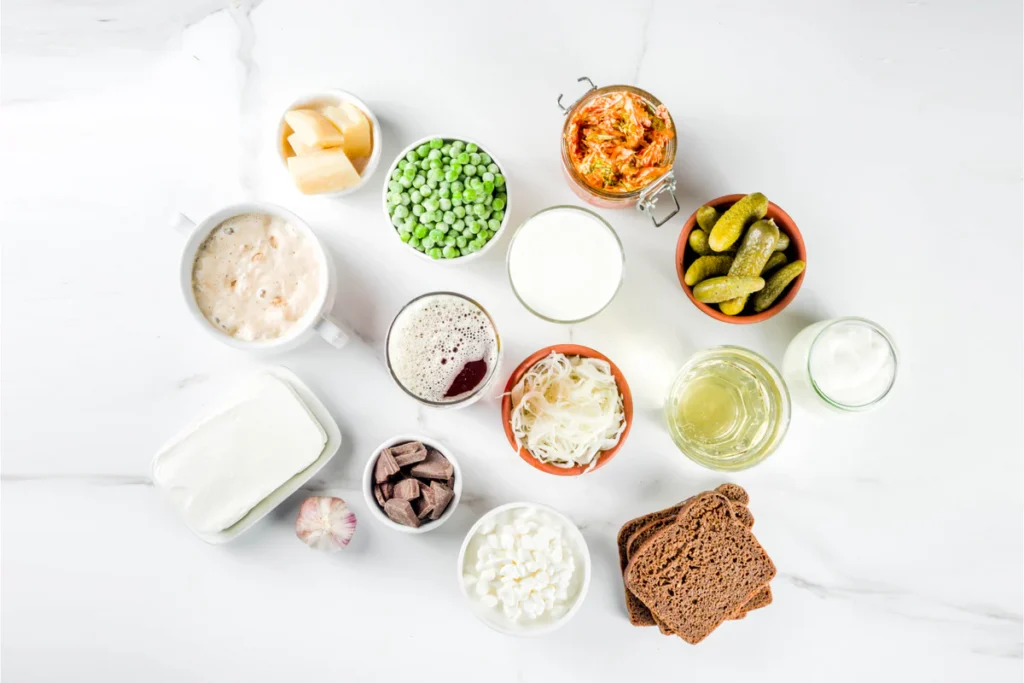
- Consistency is key: Regular consumption of probiotics ensures long-term gut health.
- Consult a nutritionist if you have digestive conditions or are on antibiotics, as certain strains may interact with medications.
- Focus on food sources first: While probiotic supplements exist, whole foods provide additional nutrients, fiber, and antioxidants that enhance overall health.
Conclusion
Probiotics are a cornerstone of gut health, contributing to digestive efficiency, immune support, nutrient absorption, mental well-being, and metabolic regulation. Vegetarian diets can easily include a variety of probiotic-rich foods, such as fermented vegetables, soy products, plant-based yogurts, sourdough bread, and kombucha.
Pairing probiotics with prebiotic fibers further enhances gut colonization and overall digestive health. By incorporating a variety of fermented foods into daily meals, individuals can support a healthy gut microbiome, improve immune function, and maintain overall wellness.
Ultimately, probiotics are not just a supplement—they are a natural, delicious, and accessible way to strengthen health from the inside out, and when integrated thoughtfully into a vegetarian diet, they offer long-lasting benefits for both body and mind.
